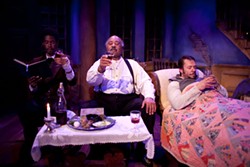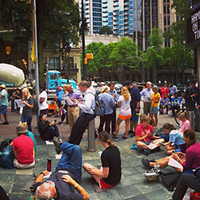The Whipping Man: Actors unchained in Civil War-era drama
Latest at Actor's Theatre offers a look at Jews in the Antebellum South
By Perry TannenbaumFor people who look down on Dixie from a distance — of geography or sanctimonious hauteur — it's extraordinary enough to learn that Southern Jewish communities have thrived for centuries despite the KKK, or that congregations in Savannah and Charleston are among the five oldest in the United States. It may be even more surprising to discover, as Matthew Lopez's much-talked-about The Whipping Man reminds us, that some of the most prestigious Jews in the antebellum South were slave owners.
Just four days after Lee's surrender at Appomattox, Captain Caleb DeLeon of the Confederate Army returns to his ruined estate in Richmond. Greeting him is his faithful servant Simon, now a freed slave but still hoping to work for the prosperous family. In the close confines of Actor's Theatre of Charlotte, Dee Blackburn's set design manages to convey how grand the home once was and how devastated it is now, offering a profusion of windows pocked with bullet holes and breakage, and deep gouges in the floor from mortar shells.
So it isn't too difficult to believe that Simon, left behind by the DeLeons to take care of the home when Lee abandoned Richmond, is close to starvation after failing to stave off the looters. Nor is it too incredible that Simon is willing to cook up Caleb's dead horse for dinner or make its shank bone part of the Passover seder. Simon has been raised Jewish in the DeLeon home, and horsemeat is unkosher no matter how you slaughter it. But Simon is starving, and Caleb has lost his faith on the Petersburg battlefield.
Bearing an uncleaned bullet wound in his leg that has turned to gangrene, Caleb is completely at the mercy of Simon. The script has flipped, and he must follow Simon's wishes, beginning with some crude surgery. There to help Simon keep Caleb still is another slave formerly owned by the DeLeons, John, a thieving scamp close to Caleb's age who comes in handy with food, dishes, cutlery and other booty that lends the seder some style.
The DeLeon family seder is an uncommonly rich ceremony, for Lopez takes full advantage of the fact that Passover in 1865 straddled the formal disbanding of the Confederate Army at Appomattox and Lincoln's assassination a couple of days later. There is horror when Simon appears in the DeLeon doorway with news of Lincoln's death and the jubilation in Richmond. More horrors await him as secrets being kept by Caleb and John are revealed during the traditional reading of the Haggadah, turning his world and his future upside down.
Simon, who was a close pal of Caleb's in his childhood until a pivotal visit to the unseen Whipping Man, is the one slave in the DeLeon household who has learned to read. So he has sufficient erudition in the Pentateuch to challenge the core of Caleb's Jewishness on the very question of his slave ownership — fueled by the anguish of John's own servitude. Yes, the institution of slavery is codified extensively in the Bible, but Jews are expressly forbidden to own other Jews, and John is Jewish to the bone.
There is plenty to chew on at the seder meal, but Lopez, afflicted with an aptitude for TV writing, loads his script with so many juicy twists and surprises that the central ethical and religious issues don't get sufficient airing in a production that speeds by in under two hours plus intermission. Prepare yourself for plenty of action and antagonism, plus a few fiery monologues, as we wend our way toward Simon's parting revelation.
Chip Decker directs with special emphasis on the agonies of slavery, warfare and hopes deferred. Master of dominating manic roles, Brett Gentile channels his powers into the powerless, feverish Caleb in what may be his best performance yet. He absolutely scorches Caleb's monologue at the start of Act 2, a poignant love letter — the last in a stack that couldn't be sent during the harrowing siege of Petersburg. Also surpassing himself is John W. Price as Simon, a proper dignified time bomb destined to explode as soon as he learns all that Caleb and John have been keeping from him. "Father Abraham" has been killed and now this: The detonation is startling anyway.
Jeremy DeCarlos is about as unhip as he'll ever look playing John, but the freed slave's cool rascality and seething resentment are right in his wheelhouse. John's story remains vague and puzzling, but DeCarlos makes it fit quite beautifully with his overall elusiveness. In a story so driven and swiftly paced, Hallie Gray's lighting design is invaluable in setting the mood and guiding us through the changes.
But the real eye-opener is the painstaking makeup work by Melissa Brown. Both the sight of Caleb's wounded leg and the remnants of the Whipping Man's handiwork are cringe-worthy. Keenly calculated to draw gasps and cringes, Lopez's finely crafted drama reminds us that Appomattox wasn't a fairy-tale ending. There were lingering wounds and scars, and there were many conflicts and injustices across America that the Civil War didn't settle. As this unique Jewish family demonstrates, there were also many important lessons remaining to be learned.
Speaking of...
-

The Art of Influence
Aug 2, 2020 -

Advanced Screening to Little
Apr 2, 2019 -

One Man's Trash is Girlbage's Treasure
Sep 19, 2018 - More »
Latest in Performing Arts
More by Perry Tannenbaum
Calendar
-

NEW WINDOW GALLERY-Pat Rhea-ACRYLIC PAINTINGS-April 05-30 2024 VALDESE, NC 28690 @ New Window Gallery/Play It Again Records
- Through April 30, 12 p.m.
-
Derek Hough - Symphony Of Dance @ Ovens Auditorium
-

"Blood Residue Analysis of Paleoamerican Stone Tools in the Carolinas" @ Native American Studies Center
- Fri., April 26, 12-1 p.m.
-

ARTS RENAISSANCE, a GALA supporting the ARTS in South Carolina @ the Columbia Museum of ART
-
 The Piano Guys @ Ovens Auditorium
The Piano Guys @ Ovens Auditorium
-
The death of CAST 5
What really happened to Charlotte's beloved experimental theater company?
-
Jessica Moss Makes the Gantt Center a Safe Zone for Local Artists 2
Flipping the script
-
Charlotte ink 7
Behind the pain with a trio of the Queen City's finest tattoo artists














